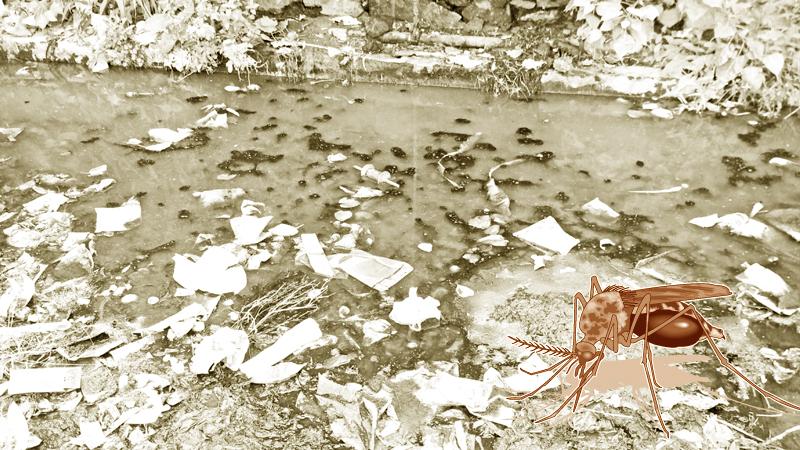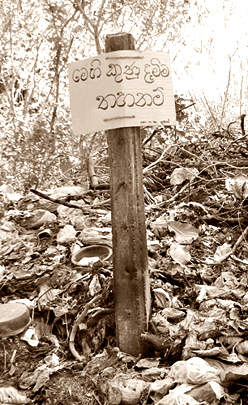
Seven districts exceed the 600 limit with Colombo heading the list
So, it has finally been announced: the discovery of a once and for all solution to our dismal battle against the tiny vector responsible for carrying the deadly disease across the country irrespective of age, class or ethnic barriers.
 On Thursday, February 8, the media reported the launching of a ‘ self sustaining program that helps provide long term protection for communities from dengue”, which is set to be rolled out following the signing of a Collaborative Agreement by the Secretary, Ministry of Health Janaka Sugathadasa at a ceremony with the Australian High Commissioner Bryce Hutchesson.
On Thursday, February 8, the media reported the launching of a ‘ self sustaining program that helps provide long term protection for communities from dengue”, which is set to be rolled out following the signing of a Collaborative Agreement by the Secretary, Ministry of Health Janaka Sugathadasa at a ceremony with the Australian High Commissioner Bryce Hutchesson.
Complacency
Meanwhile, as we await the results of the program to be released next year, the local dengue authorities are taking no chances with the likelihood that lulled by a sense of complacency, the public and even their own health personnel could slacken their efforts of keeping a sustained and vigilant watch on the movements of the dengue virus and areas where the risk was currently mounting.
The figures dropped due to several interventions by the Dengue Control Unit and the Health Ministry, compared to last year’s figures which peaked at 142,361 with over 320 deaths. According to the Epidemiology Unit this was largely due to all four variations of Dengue seen in Sri Lanka circulating at the same time and the fact that Type 2 ( DEN-2) was not a usual major circulating type which made the Lankan population susceptible to it due to immunological mechanisms.
‘Breeders’ taken to task
Although we are still two months ahead of the North West monsoon, usually experienced in April, when dengue is expected to reach its first peak season, the present weather patterns of scattered drizzles followed by bright sunshine are ideal for proliferating breeding sites.
The Colombo Municipal Council says, it has filed action against 9,300 land owners who have ignored reminders to get rid of breeding sites on their properties of whom 132 were house premises. “We are also now empowered to fine and jail such persons as well as enter their premises on a complaint.
The problem is, though they know of this facility, we still need more positive response from the public- although it has now improved due to awareness raising”, Chief Medical Officer Dr Ruwan Wijemuni told the Sunday Observer. “We are currently inspecting all schools as well for breeding grounds and seek the cooperation of school authorities, students and parents”, he added. A rewards system for premises free of mosquitoes being given an environmentally green star on a temporary basis is also paying dividends, he says, with more householders cooperating.
Yet, despite this and the fact that more fogging machines have been installed in Colombo, and more precautions taken in high risk areas, at least seven districts in the country have reported over 500 suspected dengue cases in the first one and a half months of this year.
The Colombo district headed the list with a total of 1,355 followed by Gampaha ( 801) , Kalutara 711 , Kandy 557, Jaffna 717, Batticaloa 710 and Kalmunai 567.
Why?
“People have to change their habits and become more responsible for their own health”, says Dr Wijeymuni.
“Those piles of garbage down lanes near houses are not because the garbage collectors have failed to do their duty since they have been instructed to collect garbage on appointed days, and keep the residents aware.
What you see is garbage thrown onto the road even on other days by householders who should be getting rid of their kitchen refuse by digging a compost pit in their backyard instead.”, says an environmental activist.
Wrapping sheets
“What we need is more vigilant societies formed by volunteers, who can go round and educate their neighbours on the danger of allowing garbage to accumulate even for a day after being exposed to a light shower followed by hot sun, when mosquitoes can breed.”, he says.
Use biodegradable sheets to put your garbage and recycle them. This advice comes from the Central Environment Authority, who are reported to have said, these bags were now available in all supermarkets, manufactured by Plastic Packaging Ptd Ltd ( PPP).
The CEA is also reportedly inviting all manufacturers and importers of biodegradable and compostable products to be registered with the CEA to ensure that they comply with standards of the Sri Lanka Standards Institute. More details can be obtained from their website www.pppcompostablebag.com.
So, to come back to our main question: What really is the solution to our dengue problem?
To quote an unnamed health official , “Ultimately, it boils down to us the public who are the first to pollute the environment- not the dogs, cats, cattle, or crows.
If we care about our environment, our own health, where we refrain from sending our children to school when they have fever thus infecting others, and follow the guidelines given to us with regard to dengue, we should be much better able to tackle the dengue menace. If this does not happen, even after the new proposed program gets underway, we will continue to be victims of dengue”.
What do our readers say?
